Delta 4 was a British software developer founded by Fergus McNeill, writing and publishing interactive fiction.

Mindscape was a video game developer and publisher. The company was founded by Roger Buoy in October 1983 in Northbrook, Illinois, originally as part of SFN Companies until a management buyout was completed in 1987. Mindscape went public in 1988 and was subsequently acquired in 1990 by The Software Toolworks, eyeing Mindscape's Nintendo license. When Toolworks was acquired by Pearson plc in 1994, Mindscape became the primary identity for the development group. Mindscape was then sold to The Learning Company in 1998 and bought out by Jean-Pierre Nordman in 2001, becoming headquartered in Boulogne-Billancourt, France. Following the poor performance of its products, Mindscape exited the video game industry in August 2011. Notable titles released by Mindscape include the MacVenture series, Balance of Power, Moonstone: A Hard Days Knight, Legend, Warhammer: Shadow of the Horned Rat, Warhammer: Dark Omen and Lego Island.

Stardust is a single screen multidirectional shooter video game for the Amiga, released by the Finnish company Bloodhouse in 1993. The game is an Asteroids clone with enhancements, such as power-ups, shields, a high-energy techno module soundtrack, vivid use of colors and the occasional tunnel section that revolves around a sphere. The game's graphics drew critical acclaim for the aforementioned tunnels and the liberal use of ray-tracing. The company has since merged with Terramarque to form Housemarque.
Rage Software plc was a British video game developer. Formed in Liverpool in 1992, its video games were marked by an emphasis on graphical effects with arcade gameplay.

Cinemaware was a video game developer and publisher. It had released several titles in the 1980s based on various film themes. The company was resurrected in 2000, before being acquired by eGames in 2005.

Pinball Illusions is an Amiga and MS-DOS pinball video game developed by Digital Illusions CE (DICE) in 1995 as a sequel of Pinball Fantasies and Pinball Dreams.
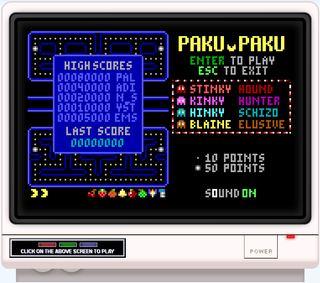
A personal computer game, also known as a computer game or abbreviated PC game, is a video game played on a personal computer (PC). They are defined by the open platform nature of PC systems.
Artworx was a Naples, Florida software company that produced and supported a line of computer games from 1981 to 2015. It is named after the founder's given name. At first the company published a variety of games, including titles in adventure and arcade-action genres, but were later best known for a strip poker series.
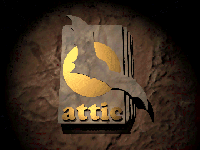
The Attic Entertainment Software GmbH was a German video game developer and publisher that was founded in September 1990 by Hans-Jürgen Brändle, Jochen Hamma and Guido Henkel in Albstadt, Baden-Württemberg. Attic has been inactive since 2001. The founder, Hans-Jürgen Brändle, was reported to have died in Las Vegas during the month of August, 2005.

Football Glory is a 1994 football video game developed by Croteam and published by Black Legend. One or two players compete in football matches viewed from a top-down perspective and modelled after one of six leagues and cups. The players can perform various moves, including tackles and bicycle kicks, and view instant replays of highlights. The pitch is occasionally invaded by dogs, streakers, hooligans, and police.
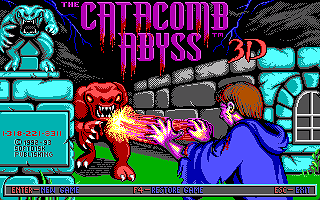
Catacomb Abyss is a fantasy themed first-person shooter (FPS) game developed by Softdisk and released in November 1992 for MS-DOS. It is the fourth entry in the Catacomb series of video games. Its predecessor, Catacomb 3-D, was developed by id Software as part of a contract with Softdisk. When the contract ended, Softdisk kept ownership of both the 3D engine as well as the intellectual property of Catacomb 3-D. The company formed a new, in-house team to develop three sequels, known as the Catacomb Adventure Series. This trilogy consists of Catacomb Abyss, Catacomb Armageddon and Catacomb Apocalypse. Softdisk published a shareware version of Catacomb Abyss, which could be freely distributed and played to encourage gamers to purchase the full trilogy.

Rainbow Arts Software GmbH was a German video game publisher based in Gütersloh. The company was founded in 1984 by Marc Ullrich and Thomas Meiertoberens and acquired by Rushware in 1986. The company's decline began in the early 1990s: The distributor did not manage to cover the costs of selling the titles worldwide, while development costs were constantly rising. The Rainbow Arts name lost its notoriety since then. The parent companies Rushware and Softgold were in turn bought up by the American games manufacturer THQ in 1999. In 1999, Funsoft Holding, which acquired Rushware and sister company Softgold in 1992, sold Rushware to THQ, which was incorporated into THQ Deutschland, THQ's German operations arm. Rainbow Arts also led one of the first lawsuits in 1993 on the question whether competition exists between a software company and a bulletin board system of similar name operated by a student, so that claims under trademark law are enforceable. This was confirmed by the Munich District Court.
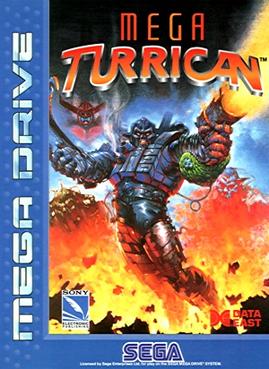
Mega Turrican is a run and gun video game, developed by Factor 5 in 1993 and marketed by Data East in 1994. Part of the Turrican series, it was designed for the Mega Drive/Genesis, and later followed by an Amiga port converted by Kaiko and Neon Studios under the title of Turrican 3: Payment Day. Despite not being the original, the Amiga version was the one that was first commercially released in 1993, published by Rainbow Arts in Germany and Renegade in the rest of Europe. The Mega Drive version did not have a publisher and stayed unreleased from spring 1993 until 1994, when Data East took over its worldwide distribution. Data East itself released the game in North America, and contracted Sony Imagesoft for the game's distribution in Europe.
Manley & Associates was an independent software developer, founded in 1982, which developed or ported over 70 video games, multimedia, and educational entertainment titles which were published by other companies, including Electronic Arts, Activision, Disney, GameTek, Publishing International, and Spectrum HoloByte. Many of the company's early games were one or two person projects created in founder Ivan Manley's house, but eventually it grew to roughly 60 people working from an office park in Issaquah, Washington.

Ishar 2: Messengers of Doom is a 1993 role-playing video game developed and published by Silmarils for the Amiga, Atari ST, MS-DOS, Atari Falcon, and Macintosh home computers. It is the second entry in the Ishar trilogy.
Tiertex Design Studios Limited was a British software development company and former video game developer based in Macclesfield, England; it was founded in 1986, focusing on porting games to home computers and handheld platforms.
Team17 Group plc is a British video game developer and publisher based in Wakefield, England. The venture was created in December 1990 through the merger of British publisher 17-Bit Software and Swedish developer Team 7. At the time, the two companies consisted of and were led by Michael Robinson, Martyn Brown and Debbie Bestwick, and Andreas Tadic, Rico Holmes and Peter Tuleby, respectively. Bestwick later became Team17's chief executive officer until 1 January 2024. After their first game, Full Contact (1991) for the Amiga, the studio followed up with multiple number-one releases on that platform and saw major success with Andy Davidson's Worms in 1995, the resulting franchise of which still remains as the company's primary development output, having developed over 20 entries in it.

Abandoned Places: A Time for Heroes is a 1992 Hungarian dungeon crawler role-playing video game developed by ArtGame and published by International Computer Entertainment for Amiga and DOS platforms. A sequel, Abandoned Places 2, was released in 1993 for Amiga.
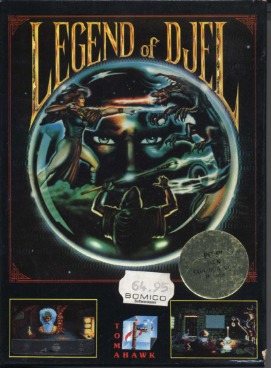
Legend of Djel is an adventure game developed by Coktel Vision and Inférence and published in 1989 by Tomahawk for Amiga, Atari ST, and MS-DOS.

Art Data Interactive was an American video game developer and publisher founded in 1993, associated with its port of Doom for the 3DO Interactive Multiplayer, which was met with negative reception. The company became inactive by 1997, and defunct as a business in 1999.













